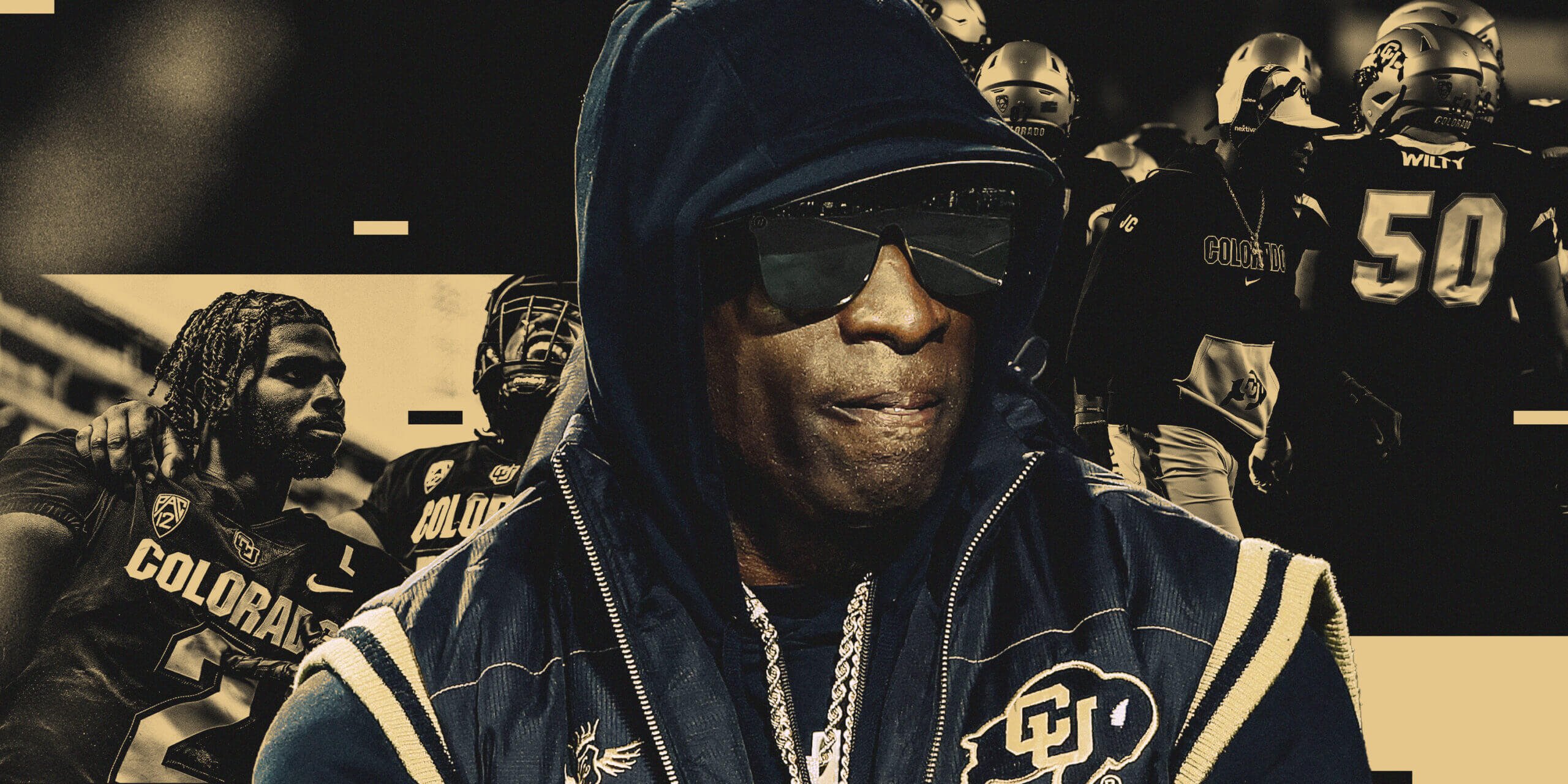
By David Ubben, Bruce Feldman and Justin Williams
Deion Sanders stood in front of the Colorado football team in the visiting locker room moments before the Buffs took the field for their season finale last Saturday at Utah. The head coach was decked out in all black, save for a pair of custom gold Nike shoes.
The season began with the Book of Genesis, he told his team, but now Colorado had reached the Book of Revelation.
“There’s a lot of folks that started out great and done one thing at the end to just mess it all up. There’s a lot of folks that started out bad and did one thing at the end to make it all good,” he added, nodding his head. “You can make everybody forget every dern thing today. And it could be a heck of a plane ride (home).”
Instead, Colorado lost to the Utes 23-17, completing a fall of biblical proportions. The Buffaloes closed the season with six losses in a row and eight in their last nine games.
They were the toast of college football in September. Coach Prime was a phenomenon, seen everywhere from “60 Minutes” to national California Almonds ads. Daily sports talk pondered whether Shedeur Sanders — Deion’s son and the Buffs starting quarterback — was a Heisman Trophy contender and the best NFL prospect at his position and lauded wide receiver/cornerback Travis Hunter for resurrecting the two-way star. Fox and ESPN’s Saturday pregame shows jockeyed for position on the scenic Boulder campus, much like the celebrities and influencers on Colorado’s sideline.
In a sport regularly dominated by blue bloods and familiar storylines, Colorado and Coach Prime were an injection of new energy. Love it or hate it, and there was plenty of both, people tuned in, and Sanders played to the crowd. He pounded the table at his postgame news conference following Colorado’s season-opening upset of TCU and asked: “Do you believe?”

GO DEEPER
Deion Sanders mania was at its peak — then came losses. How did he respond?
But now, after a 4-8 season that exposed the holes in Colorado’s roster and in Sanders’ ability to pull the right strings from the sidelines, a different question might be asked: Will Colorado be any better in 2024?
“We didn’t accomplish what we wanted, but we accomplished what we needed. I think hope is instilled, tremendously, in this city, in the student body, within this team, within this building and you see the direction that we’re headed,” Sanders said before his team’s loss to Utah.
Yet across the sport, others don’t have such a rosy outlook for the Buffs. What ailed the team — dreadful play along the offensive and defensive line, a lack of depth across the roster — is not easily fixed, and there are expected to be key departures from Sanders’ coaching staff.
The Athletic spoke with six coordinators and assistant coaches within the Pac-12 Conference, all of whom were granted anonymity to speak candidly about an opposing program. Their assessment of Year 1 of Sanders at Colorado included the necessary caveats for how he brought a jolt of energy and attention to the long downtrodden program. However, they were largely pessimistic that Year 2 was going to bring significant improvement. Said one coach:
“It’s gonna get dark for Colorado.”
Sanders famously added 69 new scholarship athletes to the roster this season out of a total of 85, offloading a number of players he inherited from a 1-11 Colorado team in 2022. Of those newcomers, 57 were brought in after spring practice, an unprecedented turnover of an FBS program.
Sanders loaded up on skill-position talent via the transfer portal, most notably with Hunter and his sons, Shedeur and Shilo, all of whom followed him from Jackson State. But the depth behind them was paper-thin and, more critically, the talent brought in along the offensive and defensive lines was subpar.
“They were loading up on all these skill players, but they weren’t getting great players on the line,” said a Pac-12 assistant. “Offensive line-wise, they didn’t take a single coveted guy out of the portal.” That coach also noted that four of the defensive linemen Colorado brought in were not good enough. “We didn’t pursue them,” he said.
Said another Pac-12 assistant: “They were horrible on the front. They couldn’t protect (Shedeur). He was getting massacred in our game. It’s really hard to do anything when you can’t block anybody.”
Colorado finished the season second-to-last among 133 FBS teams in sacks allowed with 56 and last in rushing yards per attempt at 2.31.
The combination of no running game, poor pass blocking, injuries and playing from behind made for a brutal formula. Shedeur needed pain injections late in the season and struggled to grip a ball after a hit against Washington State. He sat out the Utah game with a “fracture in his back,” according to a video posted by Deion Sanders Jr.

Colorado quarterback Shedeur Sanders couldn’t finish the season due to injury. (Matthew Stockman / Getty Images)
“They have a lot of speed outside, and their receivers were just as good as anyone we played. It was really just that the offensive line was so overmatched and they didn’t have a tight end at all,” said another Pac-12 assistant. “Not having a tight end who can block was a bigger deal than a lot of people think. That really hurts an offense. They didn’t have any answers in protection because of that.”
Shedeur could declare for the NFL Draft but is expected to return to Colorado for 2024. The 2023 season showed that he gives the Buffaloes a chance. But poor line play can dash that chance just the same. Earlier this season, as the hits on his son piled up and frustrations simmered, Sanders forecasted the cure: “The big picture is you get new linemen. That’s the picture, and I’m going to paint it perfectly.”
Colorado is set to add Jackson State transfer Tyler Brown, who sat out this season when the NCAA refused his request for immediate eligibility. Beyond that, the team has just one offensive lineman committed in its 2024 recruiting class — three-star junior college transfer Issiah Walker Jr. — with three weeks before the early signing period.
The next transfer portal window opens Dec. 4. One coach, referencing his experience, projects roughly 30 Power 5-quality offensive line starters to enter the transfer portal in a typical offseason. “There are 65 Power 5 schools,” that coach said. “There’s no way in hell you’re gonna get a whole new line for Shedeur.”
Unless you really pay for it. But Sanders said last week that “we’re not an ATM,” alluding to the growing impact of name, image and likeness (NIL) earnings on players’ transfer decisions. “We want players that want us,” he added. “Trying to convince somebody and doing that, being held hostage financially, we ain’t with that.”
Even if Colorado could go the NIL route, offensive line is a position group where experience and continuity matter. Michigan, which won the Joe Moore Award the past two seasons as the nation’s best offensive line, ran out a starting five against Ohio State last Saturday that featured all seniors or graduate students with 203 combined starts.
“It’s a developmental position,” said one Pac-12 assistant. “It took us like three, four years to have a middle-of-the-pack O-line. It takes time to do that. They have to stick it out and develop.”
Recruiting sizzle was a big part of the Sanders appeal when he was hired, and there was an immediate payoff: The Buffs’ 2023 class was rated 29th nationally by the 247Sports Composite, including the top-rated transfer class. But that momentum seems to have slowed, at least with high school recruits. Colorado’s 2024 class currently features nine commitments and ranks 65th nationally.
On Monday, the lone 2024 quarterback commit — Danny O’Neil from Indianapolis — decommitted, citing the “possibility of coaching changes and instability across the board” in an interview with the Indianapolis Star. Earlier this month, two four-star commits from the 2025 class — athlete Winston Watkins, who committed the day Sanders was hired at Colorado, and quarterback Antwann Hill Jr. — backed out of their commitments to the Buffs. Talan Chandler, a three-star 2024 offensive line prospect from Nevada, Mo., who committed to Colorado in February, flipped to in-state Missouri earlier this month.

GO DEEPER
Wasserman: Deion Sanders’ poor recruiting results major issue for Colorado’s build
There was a belief after Colorado announced it would move to the Big 12 in 2024 that it would help the school gain a recruiting foothold in talent-rich Texas, where Sanders played (for the Dallas Cowboys) and where he remains popular. But the class currently has no commitments from recruits from Texas.
“They landed recruits on the high, and they’re sinking a little bit. They’re not sunk, but they’ve stumbled,” said another Pac-12 assistant. “You have to maintain relationships at the high school level.”
Most likely, Sanders’ roster-building will come again via the transfer portal. Except Sanders won’t have the luxury of cutting dozens of players as he did last April. Only first-year coaches are allowed to do so. Some Colorado players might enter the portal voluntarily, and Sanders can sign as many transfers as he’d like as long as he doesn’t exceed the 85-scholarship limit. But some of the assistant coaches who spoke to The Athletic speculated that Sanders wouldn’t have as many spots available as he’d like considering how many players transferred in last season and with the NCAA cracking down on immediate eligibility for multi-time transfers.
“Everything you see that we have a lack thereof or deficit, we’re going to fill that need,” Sanders said, adding that “a plethora” of those additions would be transfers. “We want to win now, right?”
In late October, following a 28-16 loss to UCLA, Sanders promoted analyst (and former NFL head coach) Pat Shurmur to co-offensive coordinator, handing him play-calling duties. That functionally demoted offensive coordinator Sean Lewis, who left a head coaching job at Kent State to join Sanders at Colorado and garnered head-coaching buzz during Colorado’s 3-0 start.
“That was embarrassing. … If I’m Sean Lewis, I’m outta there on the first opportunity,” said one assistant. That coach said that Shedeur’s propensity to hold on to the ball didn’t always fit with Lewis’s quick-release tempo system, causing a rift. That coach also said that when his team faced Colorado, after a three-and-out by the Buffs, he saw Lewis try to get Shedeur’s attention but Shedeur “pushed (Lewis) off and went to the other side of the field.”
“A lot of OCs will be hesitant to come into Colorado now seeing what Sean Lewis did,” the assistant continued. “People were talking about him as a head coach candidate after Week 4, and for you to demote him? That’s telling.”
Following the loss to Utah, Sanders said there would be “a few” changes to his staff. Lewis has taken the head coaching job at San Diego State. Tight ends coach Tim Brewster, who followed Sanders to Colorado from Jackson State and was demoted to an off-field role to make room for Shurmur’s in-season promotion, resigned Sunday. Offensive line coach Bill O’Boyle came to Colorado with Lewis, and if Lewis takes a job elsewhere, O’Boyle could leave with him. Shurmur could potentially stay on as play caller, but he joined Colorado as an analyst just before preseason camp and hasn’t been a college coach since 1998.
Given what happened to Lewis, the coaches who spoke to The Athletic predicted Sanders would have a hard time recruiting top assistants this offseason, though coaches could also see an opportunity to improve an offense with talent at the skill positions. Several also referenced what they perceived as a star system at Colorado that could make bringing in qualified coaches and creating a winning culture more challenging.
“It’s like (Sanders is) out of touch with the roster and the people in the building outside of the big names,” said one assistant.
Kavosiey Smoke, a sixth-year running back who transferred in from Kentucky, fed into that sentiment when he tweeted after the team’s blowout loss to Washington State that the Buffs could have gone undefeated if not for playing “selfish ball.”
Shedeur, Shilo and Hunter were easily three of Colorado’s most talented and productive players in 2023, but they weren’t always the most disciplined or efficient. A number of the 56 sacks the Buffs allowed were caused by Shedeur holding on to the ball too long.
Hunter has a knack for making big plays on offense and defense, but he regularly struggled in coverage. He was targeted 53 times on the season according to Pro Football Focus, giving up 30 catches for 414 yards and five touchdowns with three interceptions, which ranked 173rd nationally in yards per target.
“Their secondary was very soft. Most of their corners played soft,” said one Pac-12 assistant. “Shilo (at safety) was physical but is not a great cover guy.”

Shilo Sanders played safety on a defense that ranked 11th in the Pac-12 in yards per play allowed. (Chris Gardner / Getty Images)
Leadership, buy-in and accountability are rarely built in a single season. However, multiple opposing coaches The Athletic spoke to felt some of Colorado’s issues were self-inflicted.
“It’s not just flash and circumstance,” said another Pac-12 assistant. “You don’t go in thinking you’re just going to automatically get better players. That doesn’t happen in college football. What you have to do, at least with the good coaches I’ve been around, is you pour into the kids who are there. You give them a new lease on life. You make them believe they’re better than they are.”
Sanders talked after the loss to Utah about the foundation that had been established in terms of practice and study habits and individual expectations, a standard he said is now “in stone” for future players. Yet as far as team building and camaraderie, Sanders explained this past August that those aren’t areas he focuses on. “I don’t care about culture,” he said. “I don’t even care if they like each other. I want to win.”
Sanders’ statements since suggest he understands that culture and team building matter.
“Deion is finally realizing that culture in college football is so important and so vital,” said one assistant. “It was all hugs and kisses when he got there, but now it might be time to hear about the horror stories.”
Much of Colorado’s early-season clout stemmed from toppling national runner-up TCU as a three-touchdown underdog. But the Horned Frogs became the first team to play for a national title and finish below .500 the next year since Texas in 2009-10. Nebraska, which Colorado beat by 22 points in Week 2, was hoping to rebound under first-year coach Matt Rhule but lost its final four games to finish 5-7. Colorado State, which the Buffs defeated to complete that 3-0 start, also finished 5-7.
Next season’s move to a 16-team Big 12 Conference will introduce a fresh crop of conference opponents. After nonconference games against FCS juggernaut North Dakota State and back-to-back return trips to Nebraska and Colorado State, the Buffs will host Utah, Baylor, Oklahoma State, Kansas State and Cincinnati and travel to Arizona, Texas Tech, Kansas and UCF. Among the nine league opponents on the schedule in 2024, five won at least eight regular-season games in 2023.
It may or may not be a more forgiving schedule than in 2023, but Colorado also learned in the second half of the season what happens when opponents have tape on you. The Buffs won’t sneak up on anybody in 2024.
“We might not be where we want to be, but we sure ain’t where we used to be,” Sanders grew fond of saying as the losses mounted. That is undeniably true. Colorado is a long way from the 1-11 team it was before Sanders came to Boulder. But the Buffs are also a long way from being good, and Sanders’ coaching colleagues don’t see that changing much next year.
“The guys who have staying power in this business are blue-collar, hard-working dudes,” said a Pac-12 assistant. “I think in his heart, (Sanders is) a good guy. Ultimately that will make him successful, but there are more hard times coming for him until he figures that out.”
(Illustration by The Athletic’s Eamonn Dalton; Photos: Matthew Stockman and Dustin Bradford / Getty Images)





